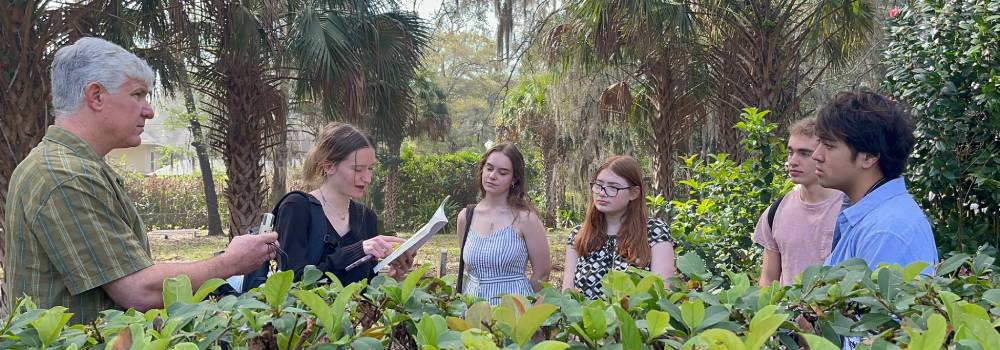The Politics of Water: Power, Justice, and the Water Rights Along the US-Mexico Border
Environmental Leadership explores the science, politics, and economics behind environmental issues through the lens of environmental justice. The 2025-26 cohort will build on a three-year field research project investigating natural resources in the small border town of Bisbee, Arizona. (See earlier phases of this project below.)
This year students will focus on efforts to restore and protect the endangered the San Pedro River. The river originates in Mexico and flows north to Arizona, crossing the border just west of Bisbee. It is an essential lifeline for the wildlife that struggles to survive in this arid location. The restoration effort reveals the unique politics of transboundary water issues.
As part of the yearlong student-led project team, participants will:
- Learn critical background information about environmental issues and research protocol
- Design a one-week field research experience
- Identify and communicate with potential interview subjects
- Travel to Bisbee over spring break for on-site interviews, site visits, and data collection
- Develop personal leadership skills by assuming responsibility for significant portions of the trip and research project
- Use technology to develop original analysis
- Build new elements of the project website
- Conduct a symposium to share key lessons with the campus community and the public.
The program is led by Howard Ernst, Professor of Political Science at the U.S. Naval Academy and non-resident expert at the Eisenhower Institute. Professor Ernst is the author of several books and academic articles on the politics of water and is widely recognized as an national expert in this area of study. With over thirteen years of experience leading Environmental Leadership, Dr. Ernst provides students a unique opportunity to gain a greater understanding of the politics of clean water, to apply social science research methods, and to develop their personal leadership skills.
These objectives are achieved through guided discussion sessions, readings, and the completion of an original research project in which participants work as a research team to design, plan, and implement a rigorous field analysis. The program features a weeklong field study during spring break (in Bisbee, Arizona) and culminates with the research team presenting their key findings and policy suggestions at a public policy symposium. Throughout the program, students are provided meaningful opportunities to interact with environmental policy leaders and to learn from leading scholars in the field. Each student will lead a major aspect of the research project and will help plan and implement the spring field study.
This program is designed from a social science perspective. It will focus on the competing values and economic pressures that fuel the politics of water. The program is divided into three complementary parts: structured discussions that provide students with the conceptual grounding necessary to understand the politics of water (conducted during Saturday sessions in the fall semester); field experiences that enable students to research the annual theme (conducted during spring break); and a student-run symposium in which seminar participants present the key lessons from their research (conducted at the end of the spring semester).
Schedule
Students are required to attend all sessions, including the spring break research trip.
Fall 2025
-
Sat., Sept. 20, 1:00-3:30 (Gettysburg), Session 1
-
Sat., Oct. 4, 11:00-5:00 (Glenstone Facility), Enviro Ethics Field Experience
-
Sat., Oct. 18, 1:00-3:30 (Gettysburg), Session 2
-
Sat., Nov. 1, 1:00-3:30 (Gettysburg), Session 3
-
Sat., Nov. 15, 1:00-3:30 (Gettysburg), Session 4
-
Sat., Dec. 6, 1:00-3:30 (Gettysburg), Research Design Planning Session
Spring 2026
-
Sat., Jan. 17, 1:00- 3:30 (Gettysburg) Field Experience Planning Session 1
-
Sat., Feb. 14, 1:00-3:30 (Gettysburg) Field Experience Planning Session 2
-
March 7-14 - Field Research Trip over Spring Break
-
Sat., April 4, 1:00-3:30 (Gettysburg) Symposium Planning Session
-
Date TBD – Student Research Symposium
Previous Research Projects and Program Outcomes
- 2024-25: The Politics of Water (Phase 2) - Students focused on the politics of industrial wastewater. While the copper mining operations have been dormant in Bisbee for more than 30 years, the environmental legacy of the mining operation remains an enduring issue. Students are constructing a GIS Story Map to track a phosphate groundwater plume that threatens the town's sole water source. The map tells the story of the plume and the people who are working to find solutions to this enduring problem.
- 2023-24: The Politics of Water (Phase 1) - Student researchers explored how Bisbee, Arizona (a small border town with deep roots to the copper mining industry) overcame the “resource curse” and became a flourishing cultural gem. This phase of the study involved extensive elite interviews among the town’s “creative class,” shedding light on the factors that can help renew former industrial towns that face economic and cultural decline.
-
2022-23: Cultural Remembrance in Bay Country - Students interviewed U.S. Naval Academy Museum Director Claude Berube on the Preble Hall podcast as part of their project exploring underrepresented cultures surrounding the Chesapeake Bay's Eastern Shore. The project was presented at the National Environmental Justice Conference on March 8, 2023 in Washington, D.C.
- 2021-22: Hidden History of Beach Segregation - Students conducted original research and field interviews on Amelia Island and in Palm Beach County, Florida in a continued exploration of segregated coastal communities, and current access issues. See and hear their work, shared in a campus wide presentation.
- 2019-20: Parking Access, Beach Usage and Race - A Study of the Relationship Between Parking Access and Racial Inequality at Public Beaches in Palm Beach County, Florida - Students used SOPARC methodology in a field research project over 5 consecutive days, resulting in a study published in the peer-reviewed journal Environmental Justice.
- 2018-19: Loxahatchee River Restoration Project - Students submitted a white paper to the South Florida water management community with policy proposals regarding water management and restoration plans along the Loxahatchee River. The proposals were the result of an original field research project, presented at a campus symposium. Their report was discussed at a meeting of the Palm Beach County Board of Commissioners.
Prospective Applicants
The program is open to all Gettysburg College rising sophomores, juniors, and seniors. Students with a strong interest in environmental protection and issues of justice are especially encouraged to apply.
As a hands-on field experience, students must be willing to get their hands dirty. Outdoor activities are an integral part of the field experience.

